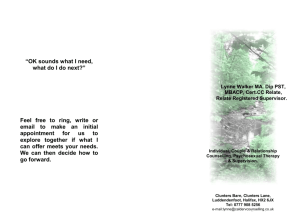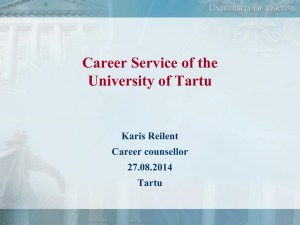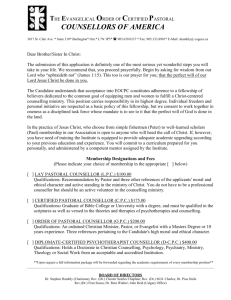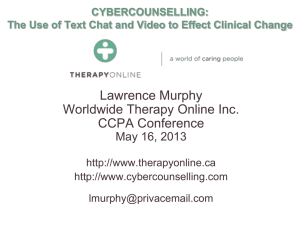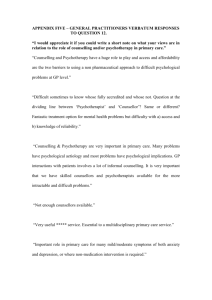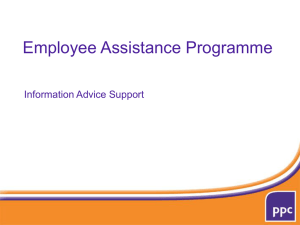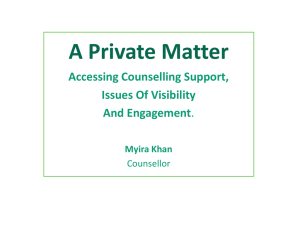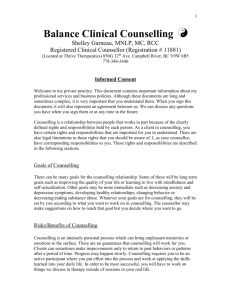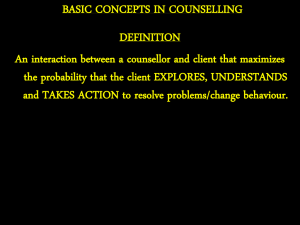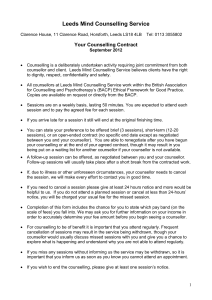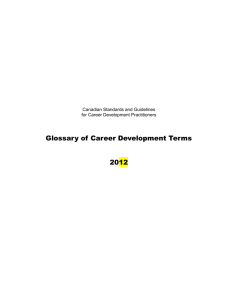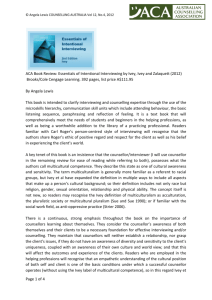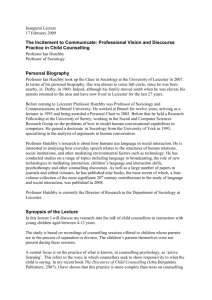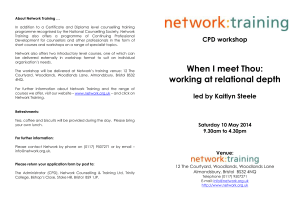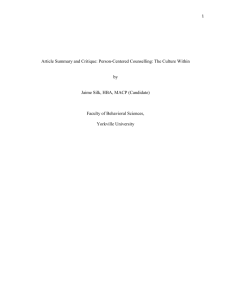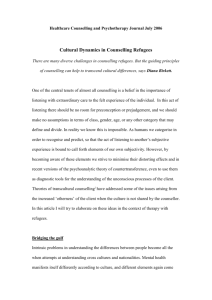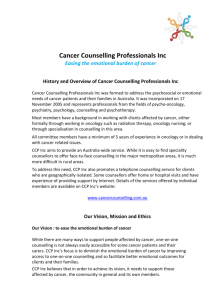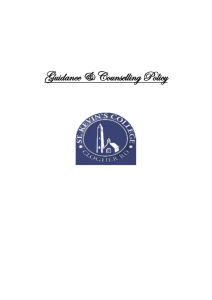The International Student Experience
advertisement
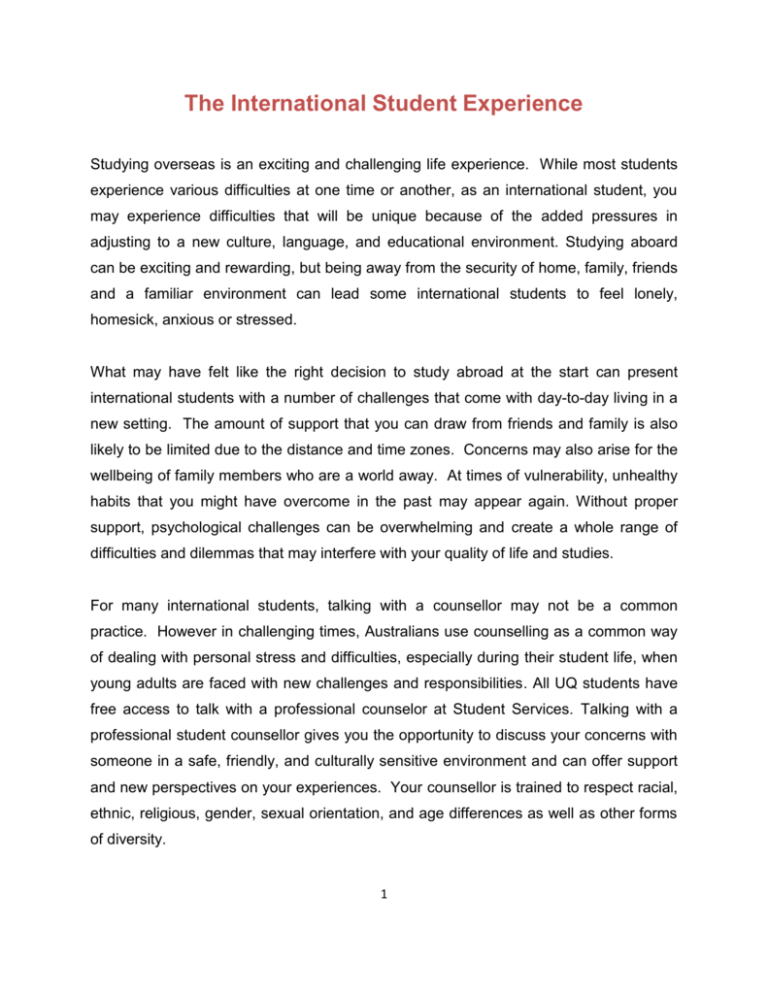
The International Student Experience Studying overseas is an exciting and challenging life experience. While most students experience various difficulties at one time or another, as an international student, you may experience difficulties that will be unique because of the added pressures in adjusting to a new culture, language, and educational environment. Studying aboard can be exciting and rewarding, but being away from the security of home, family, friends and a familiar environment can lead some international students to feel lonely, homesick, anxious or stressed. What may have felt like the right decision to study abroad at the start can present international students with a number of challenges that come with day-to-day living in a new setting. The amount of support that you can draw from friends and family is also likely to be limited due to the distance and time zones. Concerns may also arise for the wellbeing of family members who are a world away. At times of vulnerability, unhealthy habits that you might have overcome in the past may appear again. Without proper support, psychological challenges can be overwhelming and create a whole range of difficulties and dilemmas that may interfere with your quality of life and studies. For many international students, talking with a counsellor may not be a common practice. However in challenging times, Australians use counselling as a common way of dealing with personal stress and difficulties, especially during their student life, when young adults are faced with new challenges and responsibilities. All UQ students have free access to talk with a professional counselor at Student Services. Talking with a professional student counsellor gives you the opportunity to discuss your concerns with someone in a safe, friendly, and culturally sensitive environment and can offer support and new perspectives on your experiences. Your counsellor is trained to respect racial, ethnic, religious, gender, sexual orientation, and age differences as well as other forms of diversity. 1 INTERNATIONAL STUDENT CHALLENGES Below are some common challenges International students come across during their university experience: Separation from family and friends, loneliness, or homesickness Culture shock: Adjusting to the Australian environment, culture and way of life Communication and language difficulties Academic pressures, or differences in teaching, learning, and classroom styles Difficulties with social interactions and making new friends Family worries, leaving loved ones behind Relationship problems or dating people from different cultures Financial concerns Feeling a lack of confidence Adjusting to new roommates and living arrangements Coping with visa and immigration issues WHAT TO EXPECT Going to speak with a student counsellor may not be a familiar way of addressing problems and this can feel strange for many international students who are wondering what to expect from the counseling experience. Below are some common questions that international students have about accessing the counselling service. What is counselling? Many people think counselling is about getting analysed by some ‘expert’ who will fix their problems or offer advice on their situations. Counselling is and can be many things but advice-giving or offering fix-it solutions is a limited view. The purpose of counselling is to support you to make your own decisions. Counsellors do not tell you 2 what to do or what you should or should not do. A helpful way to think about counselling is as a tool to see your situation clearly so as to increase self-confidence, clarify values and priorities, cope with stress, overcome depression, improve relationships with friends and family, improve motivation, or become more assertive. A simple way to look at counselling is that it’s like a mirror. Counselling is a unique relationship in which the counsellor’s role is to hold up a mirror for you to see your situation clearly. Counsellors are trained to assist you to gain clearer understandings and provide respectful support for your unique background and experiences. With these new perspectives and support, you will have the acknowledgement and encouragement to help set goals, create results, and manage personal change. In other words, counselling can be a way to support you through distressing times and help improve your overall quality of life. I am from a different culture, will a counsellor understand and help me? Counsellors are committed to a multicultural practice. They provide a sensitive and ethical appreciation of cultural diversity and recognition of each student’s cultural differences. The role of a counsellor is to support, value, and respect your unique background and experience, and assist you through any difficulties that arise during your time at UQ. It is difficult to express my thoughts and feelings in English. Will this be a problem? Expressing thoughts and emotions can be challenging for anyone, particularly during distressing times. Counsellors are trained professionals and work within a multicultural practice which means to maintain a high degree of sensitivity and awareness of cultural diversity and language boundaries. Their role is to provide you with an understanding 3 of your experience within your own context and will work at the pace that feels right for you. In my culture, we are not supposed to express our concerns outside our families. Is it safe to talk with a counsellor? Counsellors are all trained professionals and understand the subtle challenges for international students from various backgrounds to access professional support. Safety is a key issue in the practice of counselling and is taken very seriously. Counsellors acknowledge that you have the right to feel safe at all times in what you share with them. Counselling may not be a common practice in your culture and so every counselor carefully works within a strict Code of Ethics which maintains a high level of sensitivity towards cultural boundaries and confidentiality. Guide for International Students http://www.uq.edu.au/international-guide/index.html 4

